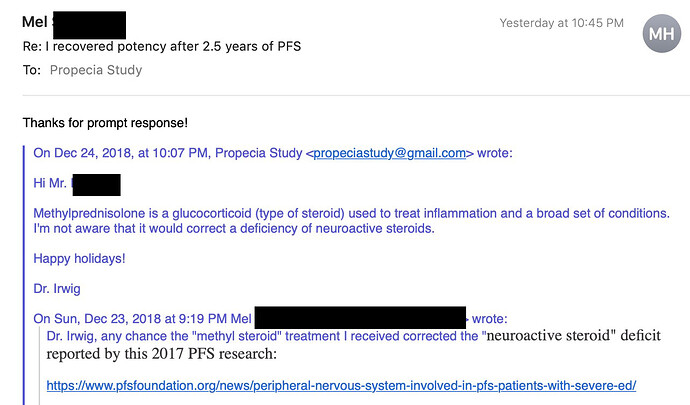Helpful “top notch” medical research!
Peripheral Nervous System Involved in PFS Patients with Severe ED, New Study Demonstrates
SOMERSET, N.J., April 18, 2017 – Post-finasteride syndrome (PFS) patients suffer from altered levels of critical brain-function regulators, including neuroactive steroids, according to a new clinical study published in The Journal of Steroid Biochemistry and Molecular Biology.
Titled Neuroactive Steroid Levels and Psychiatric and Andrological Features in Post-Finasteride Patients, the three-year study also uncovered evidence of neuropathy of the pudendal nerve among those with severe erectile dysfunction.
In all, 16 men with PFS and 25 control patients were evaluated in the study conducted at the University of Milano’s Department of Pharmacological and Biomolecular Sciences by a team of 12 researchers led by Roberto Cosimo Melcangi, Ph.D. The PFS patients had discontinued finasteride for a median of 5.4 years at the time of evaluation, and had no prior history of erectile dysfunction or depression prior to finasteride use.
Key findings of the study include broad effects on plasma and cerebrospinal fluid (CSF) neuroactive steroid levels observed in 14 PFS patients, as compared to 25 controls. Statistically significant decreased levels of DHT, pregnenolone, progesterone, 17-beta estradiol and dihydroprogesterone (DHP), and increased levels of DHEA, testosterone and 3-alpha diol were observed in the CSF of PFS patients.
In plasma, statistically significant decreased levels of DHP and allopregnanolone, and increased levels of pregnenolone, DHEA and testosterone were observed.
Decreased plasma levels of allopregnanolone and decreased CSF levels of progesterone are common features of anxious/depressive symptomatology. Important physiologic effects of neuroactive steroids on brain function include neuroendocrine control of reproduction and sex behavior, synaptic plasticity, morphology of neurons and astrocytes, maintenance of cytoskeleton proteins and myelin, adult neurogenesis, and cognition-related functions.
The study also identified, in 25 percent of PFS patients, the first objective evidence of abnormal somatosensory evoked potentials (SSEP) of the pudendal nerve. Abnormal SSEP findings were observed in PFS patients with severe ED.
Peripheral neuropathy of the pudendal nerve, the major nerve supplying the genitals that is critical for peripheral neurogenic control of erection, in PFS patients is a novel finding that demonstrates for the first time involvement of the peripheral nervous system in PFS patients with severe ED.
Additionally, 50 percent of the PFS patients were diagnosed with major depression based on the results from validated questionnaires, the Mini-International Neuropsychiatric Interview, the Beck Depression Inventory and the Beck Anxiety Inventory.
Such depression represents the first confirmation of findings in research led by Shalendar Bhasin, MD and published last year in The Journal of Clinical Endocrinology & Metabolism (Characteristics of Men Who Report Persistent Sexual Symptoms after Finasteride Use for Hair Loss), which suggested that men who experience persistent sexual dysfunction after discontinuing finasteride have “neurobiological abnormalities.”
“Among the most important milestones of Professor Melcangi’s research is that it builds directly on Dr. Bhasin’s work,” said Dr. John Santmann, CEO of the Post-Finasteride Syndrome Foundation, which sponsored the study.
“Medical science is now one step closer to characterizing the underlying biologic mechanisms of PFS, which in turn promises to pave the way for the development of effective therapies,” he added.
The full JSBMB study is available here.
Post-finasteride syndrome occurs in men who’ve taken finasteride to treat hair loss, or enlarged prostates. Reported symptoms include: loss of libido, erectile dysfunction, depression, suicidal ideation, anxiety, panic attacks, Peyronie’s disease, penile shrinkage, gynecomastia, muscle atrophy, cognitive impairment, insomnia, severely dry skin and tinnitus. The condition often has a life-altering impact on victims and their families, such as job loss and the breakup of marriages and romantic relationships, while also being linked to suicides.
As of April 2107, the World Health Organization Programme for International Drug Monitoring’s database of adverse drug reactions contained 13,533 finasteride ADRs, including 2,694 reports of erectile dysfunction, and 3,109 psychiatric disorders including 44 completed suicides and 31 suicide attempts.
In March 2015, the U.S. National Institutes of Health listed PFS on its Genetic and Rare Diseases Information Center, noting that “some patients who have taken finasteride have referred to side effects such as sexual dysfunction and depression (sometimes severe)… Studies sponsored by the NIH and other organizations are underway to better understand the effects of 5-alpha reductase inhibitor drugs.”




